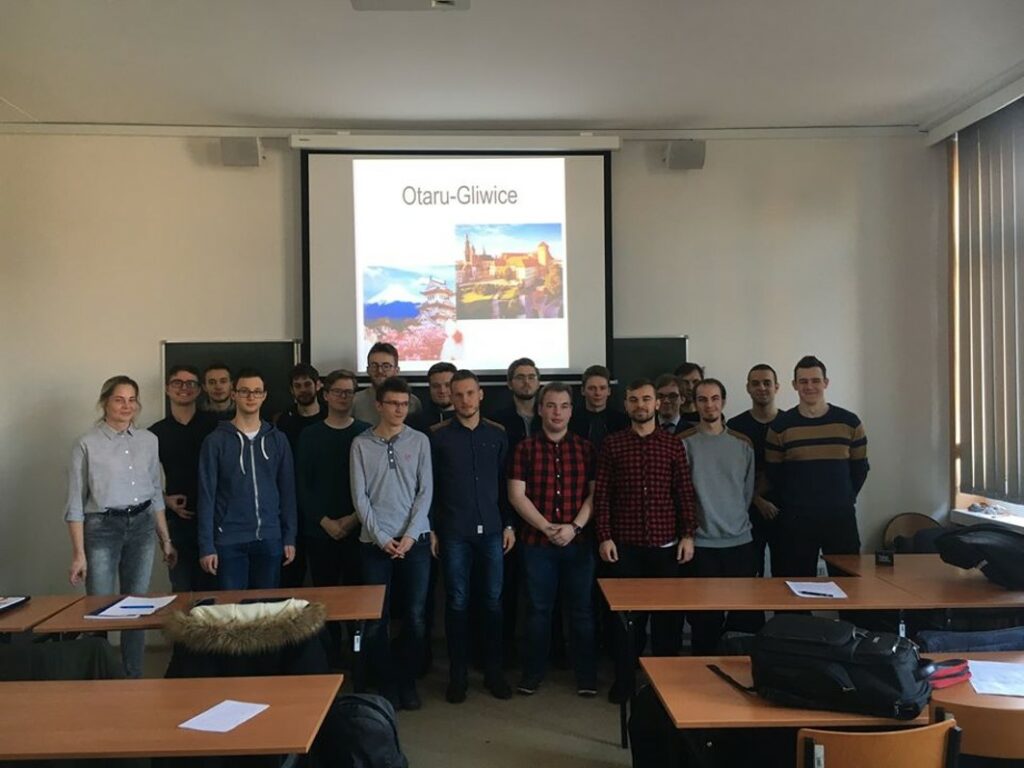Telecollaborations
* Another telecollaborative undertaking which was a joint initiative of the Foreign Languages Centre and the Otaru University of Commerce in Japan.
The participants of the project were the second-year students of Automatic Control and Robotics, Faculty of Automatic Control, Electronics and Computer Science, who under the supervision of Iwona Seta-Dąbrowska, MA, cooperated with Japanese interdepartmental group of undergraduate students supervised by Prof. Daniela Caluianu.
As the final products of this collaboration, carried out in winter semester, the international teams of Polish and Japanese students have made a series of short videos which provide an interesting insight into intercultural aspects of their life.

The outcomes of the collaboration can be seen at:
https://www.youtube.com/playlist?list=PLKpIsXTILD9yBcdUnpEGBAacmng20i0Ge
_____________________________________________________________________
* First-year students of Macro Engineering Studies at the Faculty of Automatic Control, Electronics and Computer Science as well as the Faculty of Civil Engineering at the Silesian University of Technology, as part of the German language course in the winter semester, took part, together with students of the Linnaeus University in Sweden, in a project whose main goal was to use German during the implementation of various tasks using modern communication tools.
The aim of the project was also to improve team work, enrich intercultural competences, knowledge and skills. The project participants had to perform many tasks. After the introductory part, work in international teams began. It was mainly devoted to environmental protection from a personal perspective: what can each of us do to protect the environment? The last task was to create a poster which would give advice on how each of us can take care of the environment.
The project was coordinated by two German lecturers: Corina Löwe, PhD from Sweden and Renata Pelka, MA, from Poland. The students were satisfied with the participation in the project, thanks to which they could improve their German language skills, meet people from another country and test their teamwork skills.

_____________________________________________________________________
* On May 21, 2020, the final presentation of the international telecollaboration project "Educational Game" took place. The presentation, which was an online endeavour, summarized the next edition of inter-university cooperation between the Budapest Business School and the Foreign Language Centre of the Silesian University of Technology.
The project was attended by second-year students of Technical Physics from the Institute of Physics of the Silesian University of Technology, under the supervision of Grażyna Duda, MA, and students of the Finance and Accounting Department of the Budapest School of Business under the supervision of Dr. Ildiko Dosa. The project lasted from February 27 to mid-May this year.
The topic of cooperation was to design an educational game aimed at raising awareness in the field of environmental protection combined with the ability to make strategic decisions related to this issue. In addition, the above-mentioned educational game fulfils many important functions, such as: building bonds among students (community building), which contributes to greater attractiveness of studying, developing skills in solving difficult problems and learning critical thinking.
Students worked in five international teams and had to perform tasks related to the development of game mechanics (Basic game mechanics), examining the impact of group games on the development and education of young people, creating a database of issues addressed by the game (Dilemma cards) creating a database of ecological and environmental problems that need to be resolved (Chance cards), and with the game's graphic design.
Telecollaboration projects, using modern multimedia techniques, also enable the development of many communication and language competences, as well as intercultural exchange in academic environments. Telecommunication collaboration is an important and innovative method in the development of university education.
Due to the ongoing pandemic, the project presentation was carried out completely online, using a videoconferencing platform, which in itself was an innovative solution and a considerable technical and logistical undertaking.

_____________________________________________________________________








